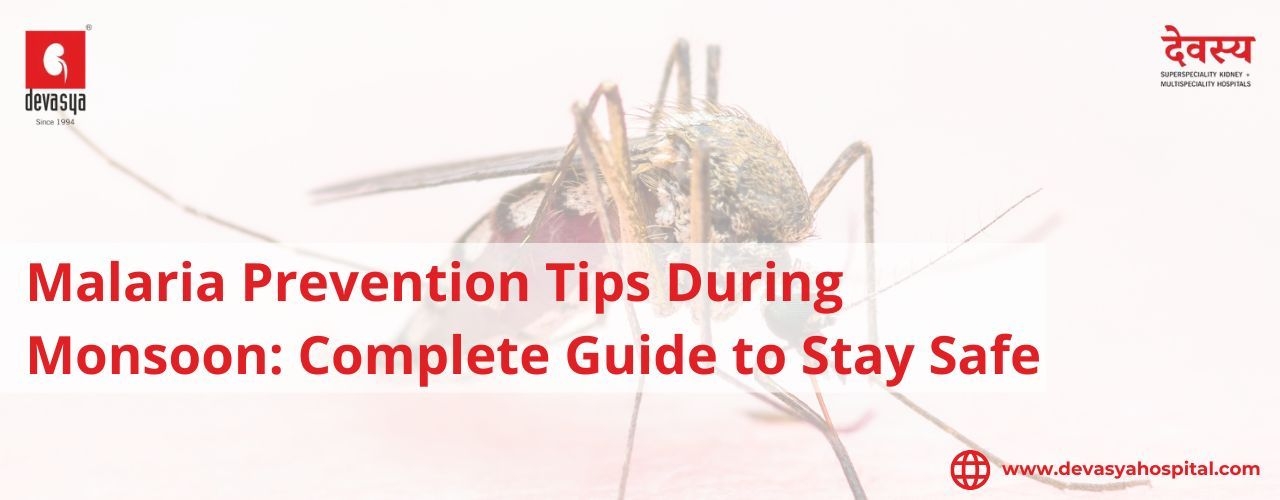Malaria Prevention Tips During Monsoon: Complete Guide to Stay Safe
Dr. Dinesh Patel
The rainy season cools us down, but it also increases the chances of Malaria. This article tells you what Malaria is, the early warning signs, and why it happens more during the rains. You will also learn easy ways to stay safe, how Malaria is different from Dengue, and when to go to a hospital for treatment. Learn about it, protect yourself, and keep your family healthy this rainy season.

Rainy evenings, damp clothes, and chai with pakoras, the monsoon in India feels refreshing. This season brings much-needed relief from the heat, but it also presents a health challenge that we all need to be prepared for: Malaria.
Spread by infected mosquito bites, Malaria can range from high fever and body chills to life-threatening complications if not treated on time.
The positive thing is that Malaria can be avoided and cured if treated in time. This blog covers what it is, why it rises in monsoon, key symptoms, prevention tips, and when to see a doctor.
What is Malaria and Why Does It Increase During Monsoon?
Malaria is a serious disease, but you can stop it from happening. You get it when an infected female Anopheles mosquito bites you and puts harmful germs in your body. These mosquitoes are different from Dengue mosquitoes - they bite at night instead of during the day.
Why do Malaria cases increase in the rainy season?
- Stagnant water: Rainwater collects in puddles and blocked drains, making them the best breeding place for mosquitoes.
- High humidity: Warm and damp weather helps mosquitoes multiply rapidly.
- Increased human exposure: People spend more time outside in the evenings, just when mosquitoes are most active.
Early Symptoms of Malaria You Should Never Ignore
Spotting Malaria early is the key to a quick recovery. The signs may seem like a strong flu, but Malaria has some clear differences. Spotting these signs early can save lives.
- High Fever: A quick rise in temperature, often with chills and a sudden feeling of cold. The fever may repeat in cycles.
- Shaking Chills: Feeling cold and shaking uncontrollably, often before the fever starts.
- Headaches: Severe pain or pressure in the head that feels hard to bear.
- Body Aches: Muscle and joint pain that makes the whole body feel weak and sore.
- Nausea and Vomiting: Feeling sick to the stomach and sometimes throwing up, mostly during high fever.
Severe Malaria warning signs (need urgent care):
- Continuous High Fever: Fever remains very high and does not decrease with medicines.
- Confusion or Drowsiness: Having trouble thinking straight or finding it hard to stay awake.
- Breathing Problems: Hard time breathing or feeling short of breath.
- Severe Anaemia: The skin may turn pale due to low red blood cell count.
- Seizures: Sudden uncontrollable shaking or jerking of the body.
These symptoms may seem like the flu, so it is imperative to see a doctor at the best hospitals in Ahmedabad and get the right tests done.
Malaria vs Dengue: Key Differences You Must Know
| What it is Caused By | Malaria (a parasite) | Dengue (a virus) |
|---|---|---|
| Mosquito | A specific type of mosquito that bites from sunset to sunrise. | A specific mosquito that bites during the day. |
| Fever Pattern | A fever that comes and goes in cycles, with chills and sweating. | A sudden and very high fever that stays on. |
| Key Symptom | A feeling of intense chills and fever cycles. | Severe headache behind the eyes and joint pain. |
| Onset | Gradual (10–15 days) | Sudden (3–7 days) |
| Complications | Affects red blood cells and can damage organs. | Platelet drop and bleeding. |
Both Malaria and Dengue can be dangerous. Do not try to guess on your own - visit a doctor quickly to get proper tests and care.
Ways to Prevent Malaria During The Rainy Season
- Use Mosquito Nets: Use an insecticide-treated mosquito net while sleeping. It blocks and repels mosquitoes while you rest.
- Install Screens on Doors and Windows: Fix mesh or screens on doors and windows to block mosquitoes from coming inside.
- Clean water storage weekly: Empty and scrub containers, overhead tanks, and barrels.
- Wear Protective Clothing: In the evening or at night, wear long-sleeved shirts, pants, and socks to cover your skin.
- Apply Mosquito Repellents: Use repellents on your skin and clothes to protect yourself from bites. Natural oils like citronella can also help, but medical repellents work best.
- Eliminate Stagnant Water: Check and empty water from flower pots, coolers, buckets, and other containers where mosquitoes can breed.
- Keep Your Surroundings Clean and Dry: Garbage, clogged drains, and unclean surroundings increase mosquito breeding. Regular cleaning keeps your neighbourhood safer.
- Be Cautious While Travelling: If visiting a high-risk area, ask a doctor about preventive antiMalarial medicines.
- Use Mosquito Coils or Vaporisers: Inside your home, especially in the evenings, use mosquito coils, liquid vaporisers, or other electronic repellents.
When to Visit a Hospital for Malaria Treatment
If you have early signs of Malaria, go to a doctor right away. Getting checked quickly and taking the right medicine can stop Malaria from getting worse. You should visit an emergency hospital in Ahmedabad immediately if you or someone in your family shows signs of severe Malaria, such as:
- Extreme weakness and fatigue.
- Confusion.
- Difficulty breathing.
- Loss of consciousness
- Jaundice (yellowing of the eyes or skin).
- Any form of abnormal bleeding.
- Severe headache that does not respond to regular pain medications.
- Dark or reduced urine output.
These are red flags that indicate a medical emergency. The sooner you act, the better. Malaria can progress quickly if untreated. Doctors usually confirm Malaria with a blood test, which checks for the Malaria parasite and its type.
This helps them decide the right medicine and treatment plan for you. Do not guess, go to the doctor.
Malaria Treatment: What You Should Know
The positive news is that Malaria can be cured with antiMalarial drugs if treatment begins early. If you do not treat Malaria, it can cause organ damage and may cost a life.
Your doctor will give you medicine based on:
- What type of Malaria germs are in your blood.
- How sick you are.
- If the germs in your area can fight off common medicines.
Some Malaria germs can beat older medicines. So doctors may use newer, stronger medicines. In severe cases, hospital care may be needed with medicines given through an IV in the arm.
Important: Even after you get better, you can still get Malaria again if another mosquito bites you. That is why you must keep protecting yourself from mosquito bites even after taking medicine.
Final Word: Stay Safe, Stay Protected
Malaria is preventable and treatable, but only if you act on time. Knowing the early signs, getting help from a doctor quickly, and staying safe from mosquito bites can save lives. During the monsoon, if you or family members show Malaria symptoms, seek help without delay.
Go to a reputed hospital where you can get tested right away and get the right treatment. At Devasya Hospital, we work hard to give you the best tests, expert care, and 24-hour emergency help. We are the best multispeciality hospital in Ahmedabad. Your health and safety always come first for us.
Malaria Prevention FAQs: Expert Answers
Can Malaria be prevented completely?
Yes! When you follow prevention tips like using mosquito nets, repellents, and removing stagnant water, you greatly reduce your risk of getting Malaria.
How can I tell if my fever is Malaria or Dengue?
Malaria usually comes with fever, chills, and sweating cycles. Dengue leads to a quick rise in fever, intense body aches, and red skin rashes. Only a doctor’s test can confirm the difference.
How long after a mosquito bite do symptoms show?
Signs usually show up 10 to 15 days after a bite from an infected mosquito.
What is the difference between Malaria and typhoid fever?
Malaria gives fever in cycles with chills and spreads through mosquito bites. Typhoid gives constant fever and spreads through dirty food and water. Only tests can confirm it.
Can Malaria spread from one person to another?
No. Malaria does not spread directly from person to person. It spreads only through mosquito bites.


